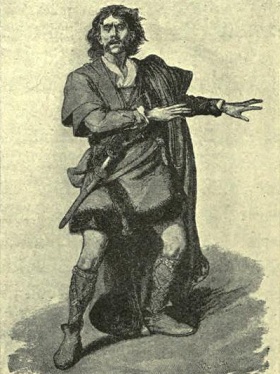| directory |
| home | contact |
|
|||||||||||||||
| search | |||||||||||||||
The Making of Poetry: Shakespeare's Out, out brief candle!From The Making of Poetry by Arthur Fairchild.Let us see if it is true that, in general, to produce poetic effect there must be some degree of personalising. I shall take the expression "brief candle" in Macbeth's speech: "She should have died hereafter;There is a magic in the expression "brief candle" which I have never known any one to deny. What is the secret of it? A candle is a commonplace enough object; in itself it is not a poetical thing; it is something useful, something with regard to which the idea of use and ownership naturally arises; it stands low down, as an inanimate thing, on the scale of images which culminates in man. Yet, as Shakespeare has used it, it is a central image in a consummate bit of poetry. What has he done to give it such distinctive worth? He has personalised. Here lies the main secret of the worth of this expression. The outlook of Shakespeare's characters is, as he represents them, always most truly signified by the particular things into which they project themselves and in which they find their chief satisfaction. At first Macbeth's life and joy were in battle and victory, in the big hope and broad ambition for distinction and renown. That ambition becomes perverted. Macbeth's thoughts turn to daggers and blood. Retribution is swift. Macbeth falls into the sear, the yellow leaf; he has "lived long enough." Life, endless, almost, in its promised possibilities, passing on through faith into a "life to come," has mockingly swung its far-seen end into full view; the purpose and the significance of men's deeds have swiftly faded out; each day dies; dusty death ends all; the poor player struts "his hour" upon the stage, and then is heard no more; life is "brief." It is precisely this intense feeling of the brevity of life that Shakespeare makes Macbeth read into or find paralleled in a burning candle. And there is justification for selecting this particular object. A candle is not, of course, really "brief"; it is short, and it burns for a relatively short time only. But we feel at once that it would be absurd for Macbeth to say, "Out, out, short candle!" What Macbeth is really thinking about is not a candle, not even the short burning-period of a candle, but life. "Short," therefore, would not do; it is too physical; it belongs to the object itself. What really justifies the term "brief" is the parallelism between Macbeth's life, as he now sees it, and a candle. Neither lasts for long; each implies a limit of time; both are about to go "out." The expression "brief candle" is, then, true to fact and true to sentiment; it is no mere pathetic fallacy. Shakespeare, therefore, in the light of his intuition, does not apply to the word "candle" an adjective appropriate directly to the object itself; he uses a word which signifies how Macbeth himself reads into the candle, or finds paralleled in it, an important part of his central experience at this moment. "Brief" crystallises in a word precisely the feeling which now so intensely affects Macbeth. It is a perfect example, in unobtrusive form, of what I mean by personalising. 1 Note 1. The difference between this kind of significant personalising and the less serious and effective form of it may be seen by comparing the expression "brief candle" with Coleridge's little poem To my Candle: Good Candle, thou that with thy brother, Fire,The italics are Coleridge's own. The word "short," accordingly, takes on special significance. It was deliberately selected. But we recognise that these lines are playful and fanciful rather than an expression of something closely connected with life. Coleridge has seen the similarity not as between a tragic life and a candle, but between an epigram and a candle. And an epigram is something that is physically "short." Coleridge therefore uses this word. "Brief" would have been less suitable. In the one case a candle is like a human life, in the other it is like an epigram. Both are true; but we value the one expression above the other in the same proportion in which we value life more than an epigram. The reader may be interested to compare with these examples Wordsworth's statement: "There never perhaps existed a schoolboy who, having, when he retired to rest, carelessly blown out his candle, and having chanced to notice, as he lay upon his bed in the ensuing darkness, the sullen light which had survived the extinguished flame, did not, at some time or other, watch that light as if his mind were bound to it by a spell. It fades and revives gathers to a point seems as if it would go out in a moment again recovers its strength, nay becomes brighter than before; it continues to shine with an endurance which in its apparent weakness is a mystery it protracts its existence so long, clinging to the power which supports it, that the observer, who had lain down in his bed so easy-minded, becomes sad and melancholy; his sympathies are touched it is to him an intimation and an image of departing human life, the thought comes nearer to him it is the life of a venerated parent, of a beloved brother or sister, or of an aged domestic; who are gone to the grave, or whose destiny it may soon be thus to linger, thus to hang upon the last point of mortal existence, thus finally to depart and to be seen no more. " How to cite this article:________ Even More |

More to Explore |
©1999-2021 Shakespeare Online. All Rights Reserved.